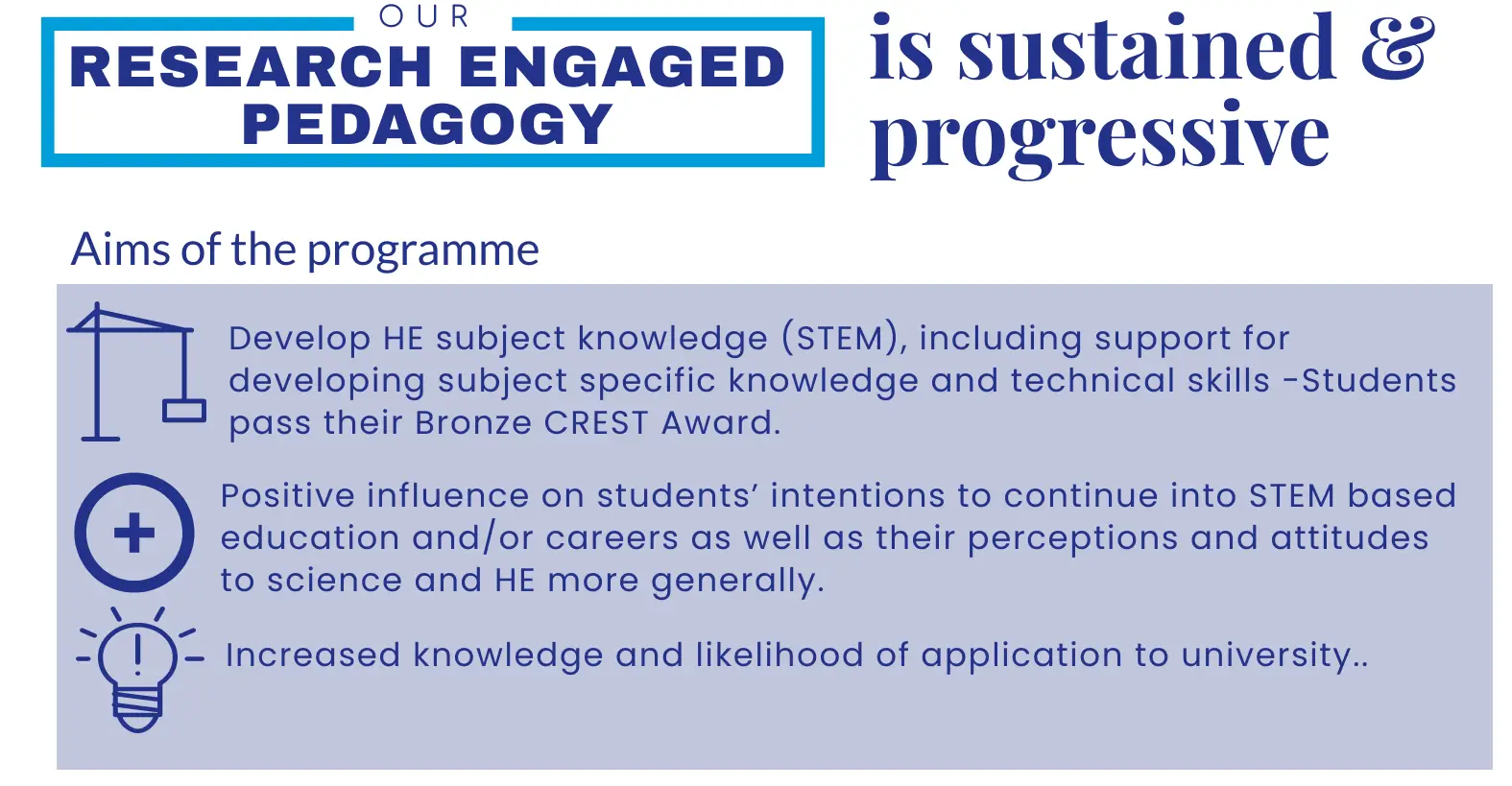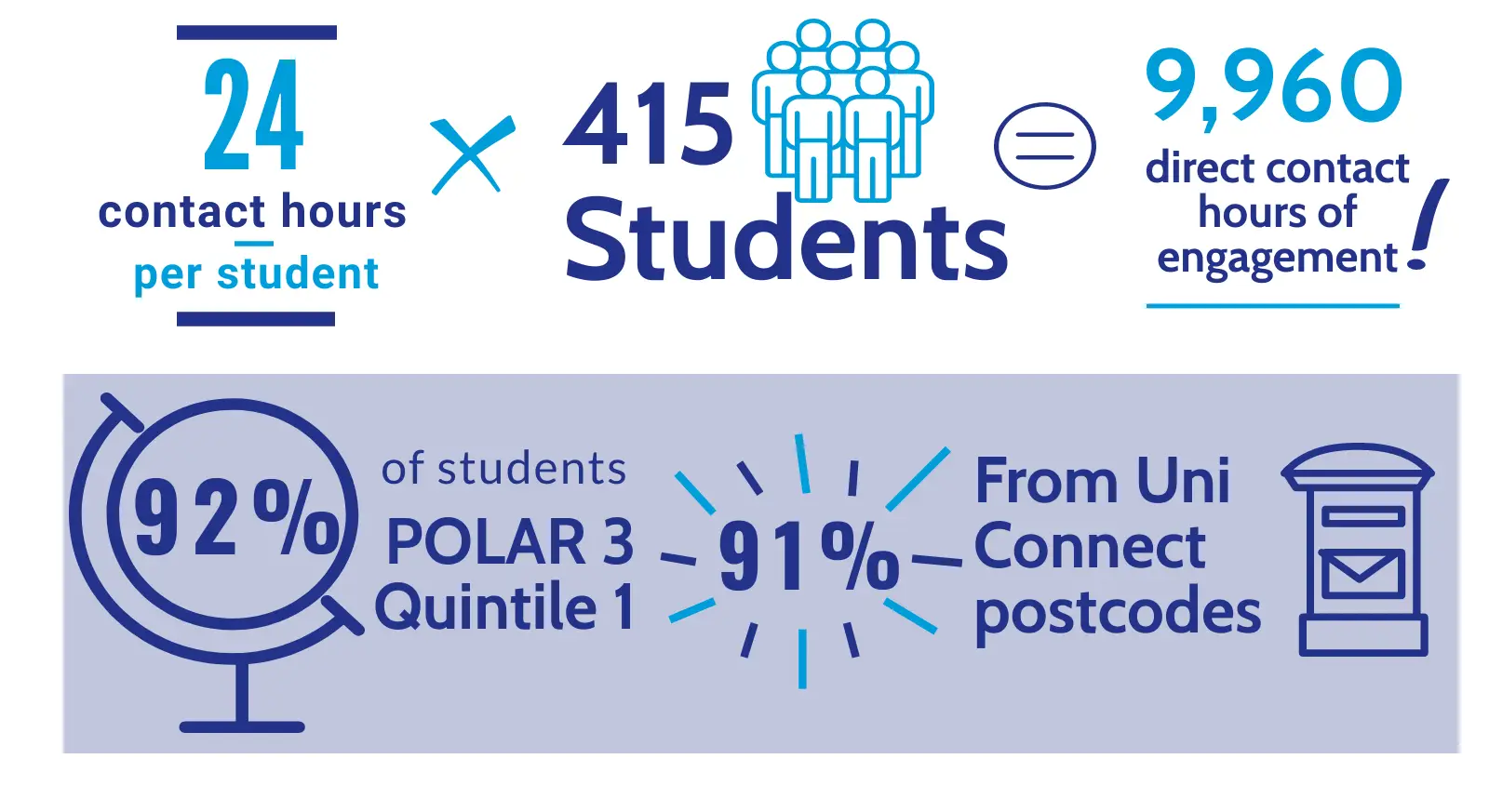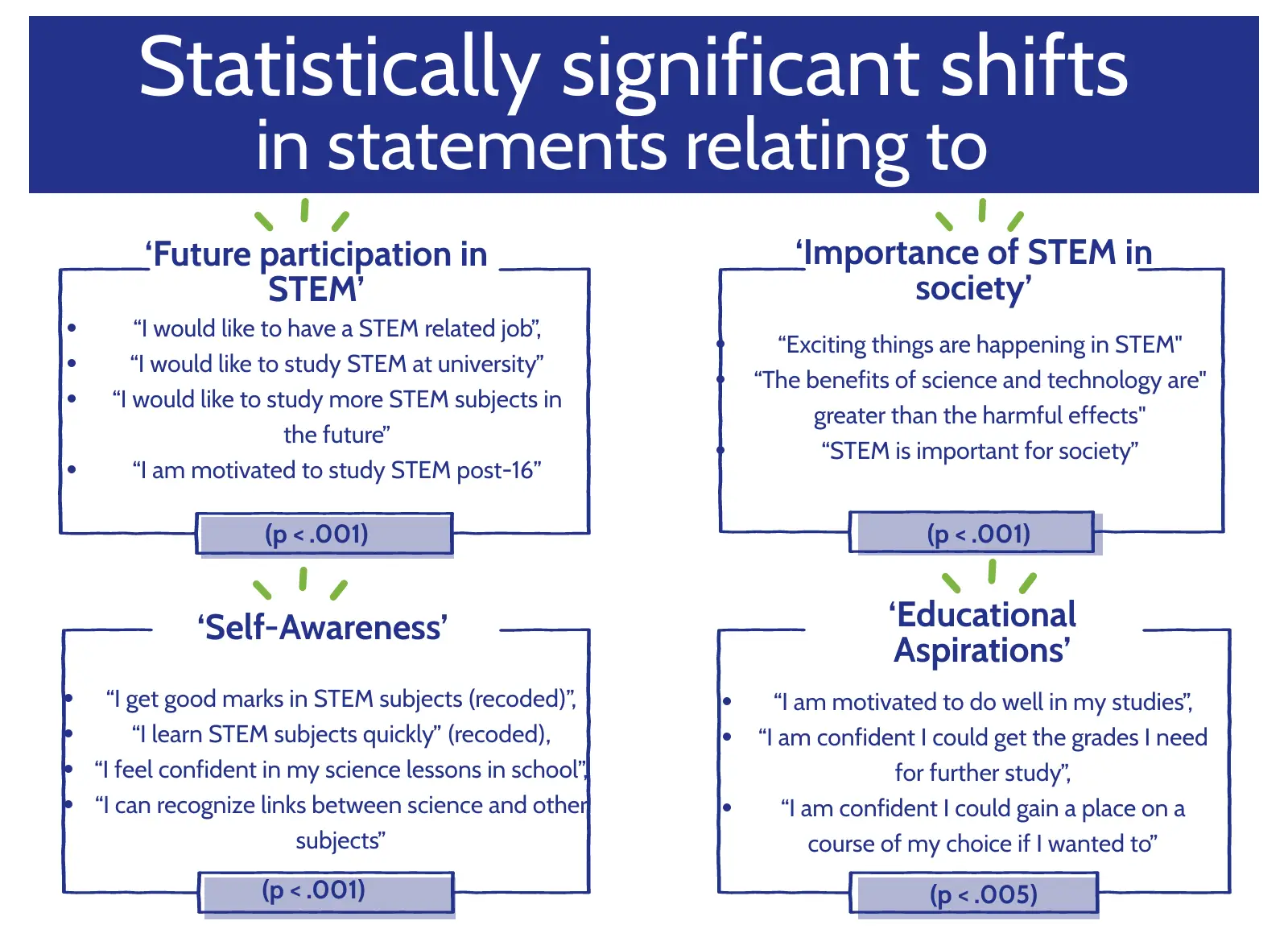What works in Widening Participation.
Inspiring Minds, the University’s pioneering engagement and outreach programme designed to encourage and support local students to study STEM subjects, has won a prestigious national award.
The inspirational programme was named the winner of the NEON Widening Access Initiative (Outreach) Award in recognition of its success in engaging young people with Higher Education, raising aspirations, boosting confidence, and helping to increase GCSE subject attainment of students attending.
Presenting the award, NEON Director Professor Graeme Atherton highlighted the University’s long-time commitment to widening participation. Speaking about the programme he praised the specific subject focus of Inspiring Minds on STEM and recognised the aspiration and attainment raising success that the programme has had on individuals over the last 5 years. He also acknowledged the sector wide value of the programme and its evaluation strategy.

The project is funded by KAMCOP and works in collaboration with the University’s LASAR Research Centre. It is built around informal science and based on an Epistemic Insight approach, where the University’s academics, student mentors and local teachers encourage curiosity about life’s Big Questions and nurture critical thinking about the nature of knowledge.
KAMCOP Project Manager, Stefan Colley, said: “It’s fantastic to be recognised for our Inspiring Minds work in this way by NEON. It is testament to the success that Inspiring Minds has reaching the most deserving young people in Kent and Medway, sparking an interest, developing a passion and raising aspirations and attainment in GCSE subjects.
“The project is a unique collaboration of Outreach practitioners, academics and ground-breaking Epistemic Insight, 'knowledge about knowledge' teaching, combined with fantastic student ambassadors, who bring the subjects to life for the young people.
“We are so proud of the young Inspiring Minds scholars who have benefitted from their time on the programme and are looking forward to working with many, many, more in the future.”
Finley Lawson, the Lead Research Fellow for Inspiring Minds at the LASAR Research Centre, said: “It is amazing to see how approaching STEM from inter-disciplinary perspectives has transformed students understanding of the nature of STEM and its value for society.”
The programme helps students to engage with their school curriculum and understand the interactions between science and other subjects whilst raising aspirations, attainment and awareness of STEM at HE and STEM careers. It includes a six-session programme targeted towards less advantaged and under-represented students in HE, focussing on building confidence. As well as residential summer schools which helps students understand HE more generally.
Data collected shows how the initiative is having demonstrable success and a significant positive impact on the aspiration and attainment of students participating.
Following the programme:
- participants were 26% more likely to achieve a 9 to 4 pass in Maths (64%) than the non-participant group (38%)
- 7% more likely to achieve a 9 to 4 pass in Science (32%) than the non-participant group (24%)
- 13% more likely to achieve a 9-4 pass in English and Maths (45%) than the non-participant group (32%)
- 64% agreed that the activities left them feeling motivated to study STEM post 16
- 68% agreed that taking part encouraged them to explore Higher Education (HE)
- 75% felt the projects helped them understand the links between science and other subjects.
The NEON Awards celebrate the transformative power that HE can have and recognises key achievements in the widening access sector and enabling social mobility.
The research shows that many of the traditional approaches and activities aimed at encouraging the most under-represented students into Higher Education are not working. These challenges are further exacerbated in the STEM Landscape where, by the age of 10, many students are already identifying as “Not STEM”. The challenge for University Widening Participation Teams becomes how to not only re-engage students with STEM but provide opportunities that can also address the attainment gap of under-represented students. With only 9% of white “working class” boys progressing to university, and over 50% of Universities admitting under 5% of students from low participation backgrounds, fundamental change is needed to the nature of Widening Participation work to enable significant progress to be made. It is into this landscape that the NEON Innovation Series was created and the Inspiring Minds project discussed in this report describes the innovative work and partnership of the only STEM outreach project to be included in the Series.

The Inspiring Minds project was conceived in 2017 at Canterbury Christ Church University through a creative and research partnership between the School and College Engagement (SCE) Team and the LASAR Research Centre in the Faculty of Education. From inception to evaluation the project is research-engaged, based in ground-breaking pedagogy designed to enable students to not only understand their school curriculum but develop a rich and deep understanding of the nature and interactions between science and their other subjects.
Understanding the impact of the experiences on students’ learning, attitudes and self-perception sits at the heart of project with evaluation designed to track students’ attitudinal shift and not simply the excitement of a day on campus. Reaching over 400 students with sustained and meaningful engagements across 2 years the Inspiring Minds project continues to develop confident scholars, engaging with big philosophical and scientific questions at the frontiers of current knowledge.

The project starts with the recognition that students are curious about the world around them, eager to create a different, more diverse world, and who with the right support and impetus are willing to step beyond their comfort zone, challenge what they think they know and speak out for their vision of the future. Across six Saturday Sessions (or a summer school) Inspiring Minds undertakes an aspirational approach to Informal STEM Learning – bringing students and academics together to raise their epistemic insight (their understanding of how knowledge and scholarship work, similar to meta-cognition) and then construct their own enquiries. In the space of a few Saturdays’ students engage with intellectual puzzles about the nature of reality and human personhood in the lights of science, artificial technology, religion and mathematics. They investigate whether a robot can think for itself, the secrets of optical illusions and the power and limitations of our senses to reveal the true nature of reality, whether mathematics is already present in the universe or whether people invented it and how they represent themselves online and the concept of a self-portrait in the modern digital age.

This research informs their own STEM projects, where they develop then apply this new, and multidisciplinary knowledge to finding solutions for real world problems before sharing their research, ideas and prototypes at a public showcase event attended by parents, careers, teacher and university professors.The project reaches out to students who often see STEM and Higher Education as “not for me” and brings them alongside academics, industry professionals, and student ambassadors to create relationships and learning opportunities where their voices are heard. The data and experiences captured in this report do not fully do justice to the work students’ put in to addressing the problems and challenges they developed solutions for. Students completing the project are empowered to re-evaluate their relationship with STEM in the classroom and voice their aspirations for the future having engaged in a project that did not speak down to where they were but lifted them up to where they could be.
Finley Lawson is Lead Research Fellow for Inspiring Minds, LASAR Research Centre, CCCU
Stefan Colley is Project Manager for Inspiring Minds and all UniConnect funded outreach provision at CCCU